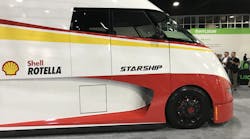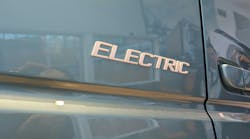If you were at TMC last week you saw a pretty cool looking truck in the Shell Lubricants booth. Christened the Starship Project, the truck is a joint initiative between Shell and AirFlow Truck Company. Shell officials say the truck was designed to discover what’s possible in reducing energy consumption in transportation.
The body of the Starship Project tractor is an aerodynamic design made of carbon fiber. This includes the side skirts, hood, and front end. A custom, Department of Transportation (DOT)-approved wrap-around windshield was designed specifically for the truck. The trailer includes energy efficient features such as full side skirts to reduce drag and a 5,000-watt solar array on top of the trailer to power interior accessories and reduce the energy load. A 2017 Cummins X15 Efficiency 6-cylinder engine with 400 horsepower and 1850-foot pounds of torque powers the Starship Project truck.
While the truck looks different from many trucks on the road, it is street legal and Shell plans to take the truck on a coast-to-coast run in May that will begin in California and end in Florida carrying a real load of cargo: clean reef material destined for a new reef installation off the coast of Florida later this summer.
Why am I telling you about this? Simply because NACFE will be providing third party validation of the freight ton efficiency of the truck. Using techniques that proved successful in last years Run on Less, cross-country road show, NACFE will be following Starship on its route to substantiate efficiency claims.
Shell is focusing on freight ton efficiency, which, in essence, is MPG times tons of payload. Shell believes it makes more sense to talk about efficiency this way and so do I. During a press conference at TMC, Shell’s Dan Arcy used this example to explain freight ton efficiency.
- One truck carrying one ton of cargo and achieves 10 MPG, which is the equivalent to 10 ton miles per gallon
- One truck carrying 20 tons of cargo may only get 7 mpg, but because of the amount of payload the truck achieves 140-ton miles per gallon.
However, it’s measured, improving fuel efficiency is something all fleets should strive for. The Starship initiative is one way to move the freight efficiency discussion forward. But there are likely many others. I encourage industry suppliers and manufacturers along with fleets to begin to work more closely together to see what other ideas we can come up with to see just what’s possible in getting the most out of a gallon of fuel.
Back when we started working on Run on Less we had a modest goal of 9 MPG, but by the time Run concluded we discovered that fleets using a variety of technologies and practices were able to average 10.1 MPG and, on four of the days during the Run, a truck actually broke the 12 MPG mark.
It’s difficult to know where we will end up in terms of MPG or freight ton efficiency. Like Shell and AirFlow Truck Company, we need to keep trying along with validating that the efficiency numbers being shared are correct and true. That is a role NACFE is happy to take on for this project and for others.



